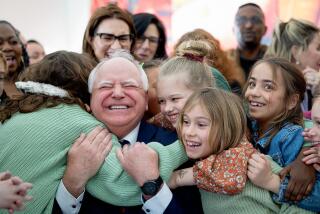VP Search Locks Out Minorities, Jackson Says
- Share via
DALLAS — The Rev. Jesse Jackson, turning up the fire on the issue of who will run with presumed Democratic presidential nominee Michael S. Dukakis, complained Friday that minorities and women are “locked out” of the selection process.
“Why has no Hispanic person, woman, a Jew, a black or labor leader been in that loop of consideration?” Jackson said during a speech to a convention of the League of United Latin American Citizens. Later, he flew to Los Angeles, where he will attend a private fund-raising event today.
Part of Pattern
Jackson’s comments, made in a rousing speech to an enthusiastic crowd, are part of a pattern over the last several days in which he has made an increasingly strong case in meetings before his delegates and supporters for being considered as Dukakis’ running mate.
It is a delicate dance between the Massachusetts governor and Jackson, reminiscent of 1984 when Jackson kept Walter F. Mondale, the Democratic nominee, guessing for weeks about whether he would support the ticket.
Sometimes coy, sometimes forceful, Jackson moves around the edge of the issue, never saying outright that he should be nominated but rather that he should be considered.
He recites in boastful detail his accomplishments during his two runs for the presidency: registration of 2 million voters in 1984; 7 million votes gathered and popularizing the issue of combatting illegal drugs in 1988.
The dance took one of many strange turns as Jackson announced that the Dukakis campaign had canceled a meeting on the vice presidency that was to have taken place Friday in Dallas.
Paul P. Brountas, the Dukakis campaign chairman who heads the vice presidential search team, called to say that the campaign had not finished evaluating information that Jackson has furnished, Jackson told reporters. Jackson said that the meeting will be rescheduled and that Dukakis had not requested any additional information.
Drummed Up Support
In preparation for the canceled meeting with Brountas, Jackson had whipped up enthusiasm and expectations among his followers in Atlanta and Memphis, Tenn.
Addressing a church filled with delegates from several states Thursday night at the Monumental Baptist Church in Memphis, Jackson said that he wanted to know “what the rules are, what the standards are, what the qualifications are” for winning the No. 2 spot on the Democratic ticket.
“There are several people under consideration,” he said, adding, “someone must be chosen based on some known standards. I just want to know what those standards are. If I have the best qualifications, obviously I should be selected, and if I do not then I should not.”
Asked if he would accept the nomination, he said that it is a “private decision to be shared with” Dukakis if he should make an offer.
While complaining that the selection process is exclusionary, Jackson repeatedly refuses to blame the man who is conducting the process.
Asked Friday if Dukakis were responsible for locking out everyone but white males, Jackson said: “The loop has been traditionally small. It has locked out most Americans from an elite circle.”
Compares Origins
In a familiar tack, Jackson compared his origins to Dukakis’ to make the point that they would complement each other as running mates. “His foreparents came over on an immigrant ship, mine came over on a slave ship,” Jackson said. “That’s balance.”
In another comparison, Jackson said that he won over more young voters than Dukakis, and “therefore, I represent the future for the Democratic Party.”
Jackson said: “In 1988 we must have a vice president who has one foot in the present and one foot in the future, not one foot in the present and one foot in the past.”
Amid a chorus of “amens” and “all rights,” Jackson said Thursday that he had “built a coalition of serious people who love America, who want to make America better and keep America strong.”
The vice presidential dance has many party regulars fretting over whether it will sour the hoped-for unity at the convention. When Jackson was asked if there might be a convention “fight,” he answered, “I certainly hope not.”
More to Read
Get the L.A. Times Politics newsletter
Deeply reported insights into legislation, politics and policy from Sacramento, Washington and beyond. In your inbox three times per week.
You may occasionally receive promotional content from the Los Angeles Times.










